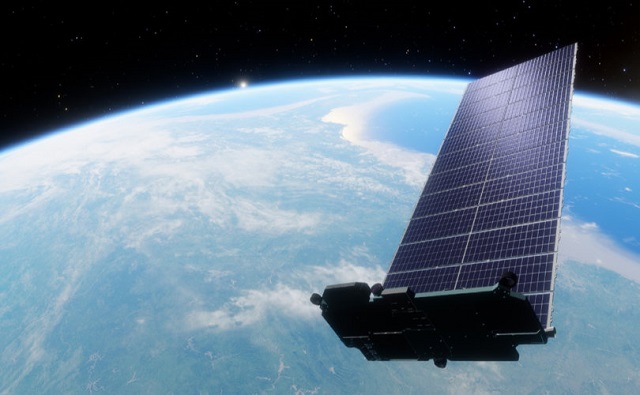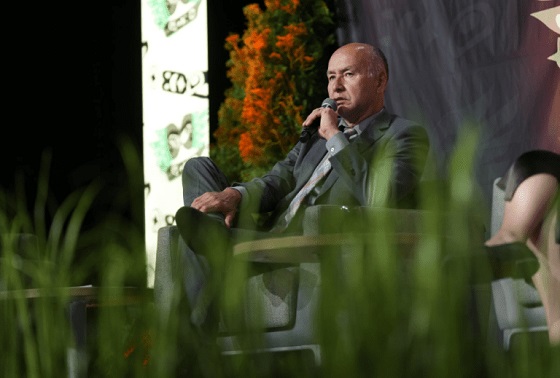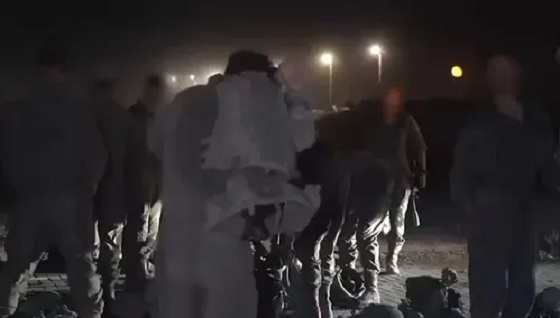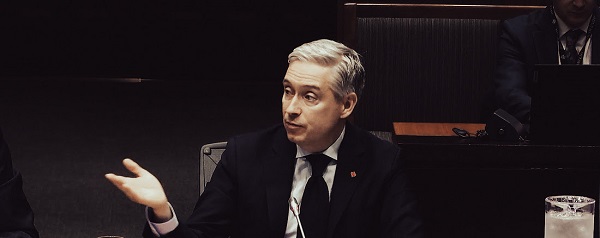Alberta
Danielle Smith partnering with Elon Musk’s Starlink to bypass federal internet censorship laws

Starlink satellite rendering
From LifeSiteNews
The Alberta government is working with SpaceX’s Starlink to avoid ‘federal government delays launching projects and allocating funding’ for internet access
The government of Alberta is partnering with Elon Musk’s SpaceX’s Starlink to bring internet to certain areas of the province to test the viability of the technology that Premier Danielle Smith said last year could be used as a firewall to bypass federal internet censorship laws.
Last Thursday, United Conservative Party (UCP) Minister of Technology and Innovation Nate Glubish announced that “advancing satellite internet technology in Alberta is an important milestone and an innovative way to achieve our goal of universal connectivity by 2027.”
Glubish said that connecting rural Albertans via Starlink is another way to “eliminate the connectivity gap.”
As a result, the Alberta government in a limited-time pilot is working with SpaceX’s Starlink to avoid “federal government delays launching projects and allocating funding” for internet access.
In June 2022 while was running for leadership of the UCP, Smith said that she would create a provincial internet firewall to bypass federal internet censorship laws with the possible help of Starlink.
“Hey @elonmusk I’m running to be the Premier of Alberta. We still value free speech here. Could Alberta set up an independent ISP using @starlink to bypass the new @justintrudeau internet censorship law,” Smith wrote.
Smith also included in her tweet last week a reminder of her message last year that said: “Did you know @JustinTrudeau’s new internet censorship law will mean Liberal partisans can pick and choose what Albertans can say and express on the Internet.”
“As Premier, I will protect the right of every Albertan to express their opinion – left, right and everything in between – without fear of Ottawa’s censorship.”
Musk’s Starlink is a satellite-operated internet provider that offers fast service from virtually anywhere in the world and is free from censorship.
Smith made the comments in light of the federal government’s internet censorship Bill C-11, the Online Streaming Act, which at the time was blasted by many as allowing the government more control of free speech through potential new draconian web regulations.
As for the Alberta Starlink pilot, it will see the government contribute $1,000 to each eligible household in the County of Forty Mile, County of Warner No. 5 and Cardston County.
The government says that the pilot will provide “feedback” for future programs regarding Alberta’s access to the internet.
Since 2019, SpaceX has launched 12,000 satellites over 60 countries to provide internet access.
As for the Trudeau government’s Bill C-11, it was passed last year. It mandates that the Canadian Radio-television and Telecommunications Commission (CRTC) oversee regulating online content on platforms such as YouTube and Netflix to ensure that such platforms are promoting content in accordance with a variety of its guidelines.
This bill has been panned by critics, Smith, and even Musk.
In October, after the CRTC said that certain podcasters must “register” with the government by November 28. In response, Musk said that “Trudeau is trying to crush free speech in Canada.”
Another Trudeau internet censorship law, Bill C-18, the Online News Act, became law in June despite warnings that it will end free speech in Canada. This new law forces social media companies to pay Canadian legacy media for news content shared on their platforms.
Smith has been in a prolonged battle with the Trudeau government over its extreme green energy policies that target Alberta, and no doubt should the Starlink trial go well, the government might look at ways to further shield Albertans from federal government overreach.
Smith’s political style leans toward libertarianism. She strongly opposed COVID mandates of all kinds, and after winning Alberta’s provincial election earlier this year, she promised to stand up for parental rights as well as to cut government bloat by taking away powers from unelected health officials.
Alberta
Fact, fiction, and the pipeline that’s paying Canada’s rent

From Resource Works
Is the Trans Mountain a fake, like some say the moon landing was faked?
It’s hard to interpret otherwise a persistent claim being made in media by British Columbia’s premier, David Eby.
This week he said that Alberta is “not even using” the new Trans Mountain pipeline from Edmonton to Metro Vancouver.


Could that be true? We decided to look into it.
Here’s what we discovered.
Since May 2024 when the Trans Mountain expansion project was opened, Alberta oil has flowed steadily down the pipeline from its origin in a suburb of Edmonton.
Credible international news organizations have reported that the new pipeline is 85% full. Indications are that by the period 2027-28, it will reach as close to 100% full as it’s possible to.
The number of ship calls to the Westridge coastal loading facility in Burnaby is on track to reach 400 by the end of the year. This strongly supports the contention that Alberta oil is flowing through the pipeline.


https://www.statcan.gc.ca/o1/en/plus/8439-trans-mountain-pipeline-delivering
I often say Trans Mountain is “paying Canada’s rent,” and I mean it literally. Ottawa owns the pipeline through Trans Mountain Corporation, and it’s already sending more than a billion dollars a year back to the federal treasury in dividends, interest, and fees.
It’s also boosting export revenues by letting Alberta oil reach world markets instead of being trapped at a discount — raising royalties, taxes, and paycheques across the Prairies. And every tanker that sails from Burnaby keeps tug crews, port workers, and coastal suppliers in business. That’s real money flowing through the economy — the kind that actually pays the rent for Canada.
In total, Resource Works examined nine claims that would all need to be true if Premier Eby is telling the truth about the pipeline being empty:
Truth Test: “Alberta isn’t even using the pipeline we bought them last time.”
| Category | Claim or Implication | Evidence / Data | Source(s) | Finding / Truth Rating |
| 1. Pipeline utilization | TMX is unused or empty. | Trans Mountain reports 757,000 bpd throughput on an 890,000 bpd capacity system (≈ 85 %). | Trans Mountain Q1 2025 Financial Results; Reuters (30 Jul 2025). |  False — pipeline is heavily used and approaching full capacity. False — pipeline is heavily used and approaching full capacity. |
| 2. Export volumes | Few or no shipments. | 306 vessels loaded at Westridge Marine Terminal by Q2 2025 (~20–25 per month). | Trans Mountain Q2 2025 Results; CER Market Snapshot (Sept 2025). |  False — consistent, large-scale exports are underway. False — consistent, large-scale exports are underway. |
| 3. Financial returns | No financial benefit to Canadians. | $729 million returned to federal government YTD 2025; projected >$1.25 billion for year. | Trans Mountain Q2 2025 Results. |  False — major positive fiscal returns already realized. False — major positive fiscal returns already realized. |
| 4. Shipper commitments | No demand for pipeline capacity. | 80 % of capacity contracted to long-term shippers; 20 % reserved for spot. | S&P Global Commodity Insights (Feb 2025); CER Snapshot. |  False — demand is locked in by long-term contracts. False — demand is locked in by long-term contracts. |
| 5. Operational timeline | Project still inactive or delayed. | Commercial service began May 1 2024; steady throughput growth each quarter. | Trans Mountain Corporate Reports 2024–25. |  False — fully operational since 2024. False — fully operational since 2024. |
| 6. Regulatory data | No verified data exist. | Monthly throughput published by CER and Trans Mountain Corp. | Canada Energy Regulator (CER Data Portal). |  False — independent regulators in fact consistently confirm the data. False — independent regulators in fact consistently confirm the data. |
| 7. Market impact | No improvement to Alberta’s market access. | WCS-Brent differential narrowed; Asia exports up sharply. | CER Market Snapshot (Sept 2025); S&P Global 2025 report. |  False — there is clear evidence of improved market access. False — there is clear evidence of improved market access. |
| 8. Ownership context | B.C. or Alberta “owns” the pipeline. | Owned by Government of Canada via Trans Mountain Corporation. | Finance Canada; Trans Mountain Corp. Ownership Statement. |  Misleading — federal ownership doesn’t mean Eby “bought Trans Mountain for Alberta.” Misleading — federal ownership doesn’t mean Eby “bought Trans Mountain for Alberta.” |
| 9. Provincial benefit analysis | No benefit to B.C. or Alberta. | Royalties, tax revenue, and employment gains in both provinces; marine services in B.C. | TMX Economic Impact Assessment 2024; CER regional reports. |  False — both provinces gain fiscal and employment benefits. False — both provinces gain fiscal and employment benefits. |
Last year, on three occasions I visited the Westridge Marine Terminal, twice on tours of the land-based facilities and the third time from the water. Ships were docked at the terminal on all three occasions, and I was told by staff that they were being loaded.
I didn’t actually see any oil at the oil terminal, but…
I have to admit I did not actually see (or smell) any oil. But I’m also aware that it is very much in the interest of the Trans Mountain Corporation to never expose any oil to where it can be seen, touched or smelled, since this would result in stiff fines and other harsh repercussions.
At this point, I have to say that there is no supporting evidence whatsoever that Alberta is using the Trans Mountain pipeline as a moon landing style hoax for some nefarious goal. There is no sign of a massive fraud that required collaboration among energy regulators, Alberta oil producers, the pipeline company, the international business press, numerous federal ministers, trade union leaders, numerous environmental organizations that expend enormous efforts to try to curtail shipments of the oil that they say moves through the pipeline, and the many First Nations that have actively supported from and benefit from the project in its completed state.
Of course, I’m well aware there is a political context here. Since October 1, Premier Eby has been engaged in a war of words with Alberta Premier Danielle Smith. She announced that she is determined to see get built another new pipe from her province to a federally regulated port somewhere on the Pacific coast.
And to be clear, this isn’t about giving Alberta a free pass. Premier Smith isn’t blameless either — she’s been happy to turn complex national issues into provincial sound bites when it suits her. The difference is that Canada can’t afford leaders on either side of the Rockies who substitute theatre for truth.
Premier Eby is right when he says British Columbians should not be forced to give up opportunities because another province wants to do something. Labour market fears are legitimate as we’ve seen in the recent past. But when it comes to infrastructure and investment opportunities, time and again Canadians have learned the hard way that “a bird in the hand is worth two in the bush.” There is no guarantee that today’s opportunities, pushed away, will materialize again at any point in the future.
There’s also a public context. At no moment in recent times have British Columbia residents been more supportive of the idea of building more oil pipeline infrastructure. The following slide from a poll by Innovative Research Group (shared by pollster Greg Lyle at a recent event organized by Resource Works) is consistent with other findings:

Even without out this quite exceptional condition, the current situation deserves a vigorous public conversation. It also deserves the truthful use of information.
My final verdict is this: We can all be fully confident that the Trans Mountain Expansion is indeed 85 per cent full, that hundreds of tankers have already sailed, and that more than a billion dollars has flowed back to Canadians.
Bottom Line
The facts show a functioning, profitable national asset:
- Operational since May 2024
- 85% utilized and rising
- Hundreds of ships exporting Canadian oil
- Over $1 billion flowing back to the public purse from Trans Mountain – that’s even before counting the upstream employment and impacts
This Resource Works analysis is based on public reports from Trans Mountain Corporation (2024 & 2025), Canada Energy Regulator (2025), Statistics Canada, S&P Global Commodity Insights, and Reuters.

Stewart Muir, visting the Trans Mountain pipeline’s Westridge Marine Terminal.
Alberta
Alberta Is Where Canadians Go When They Want To Build A Better Life

From the Frontier Centre for Public Policy
One in three Canadians chooses Alberta to start over. But to stay Canada’s top destination, it must fight Ottawa’s barriers and complacency
No province has captured the Canadian imagination quite like Alberta—and not because of oil.
One in three Canadians leaving their provinces in the past five years headed to Alberta. They were escaping stagnant wages, high housing costs and suffocating bureaucracy. They came for freedom and opportunity, and Alberta delivered. Its edge is cultural: it rewards enterprise instead of strangling it.
The question now is whether Albertans can keep that edge before Ottawa and complacency close in.
Prosperity, like liberty, vanishes the moment people stop fighting for it. If Alberta wants to remain Canada’s economic engine, it must continue to move forward, tearing down old barriers while fending off the new ones that Ottawa and other provinces are always erecting.
The cost of standing still is staggering.
Economists say provincial trade barriers (rules that prevent goods, services, and workers from moving freely) cost the Canadian economy up to $130 billion a year. For Alberta, even a 10 per cent reduction would be worth $7.3 billion a year.
When Quebec killed the Energy East pipeline that would have carried Alberta crude to eastern refineries, Alberta lost the chance to export oil worth as much as $15 billion annually.
That’s not theory. That’s lost paycheques, lost tax revenue and public services that never materialized.
Alberta has always been more willing than others to break free from the barriers that hold back growth. Liquor sales were privatized decades ago, as were property registries. The New West Partnership with Saskatchewan, Manitoba and B.C. opened labour mobility and procurement, though it has since stalled. Alberta doesn’t impose cultural tests and it doesn’t levy a provincial sales tax. Families arrive because life here is easier. They can work, start a business, raise kids or simply breathe without bureaucrats looking over their shoulder.
But cracks remain. Liquor shelves may be free, but the Alberta Gaming, Liquor and Cannabis Commission monopoly clogs the warehouse. Professional associations in law, teaching and health care are slow to recognize credentials and drown their members in red tape.
Procurement often tilts local, because, apparently, free markets stop at the city line. And like every other province, Alberta still bows to Ottawa’s anticompetition telecom rules, the dairy and poultry cartel and the banking oligopoly, systems that consistently benefit Quebec farmers and Bay Street lenders at Alberta’s expense.
And as if the old cracks weren’t enough, new barriers are appearing. One of the worst is protectionism. Canadians love mocking Donald Trump’s tariffs, yet happily embrace the same thing at home. “Buy local” sounds warm and fuzzy but props up cartels in groceries, banking, telecom and construction. The truth? We’ve imposed more barriers on ourselves than Trump ever dreamed of.
Prime Minister Mark Carney exemplified the problem when he promoted subsidies for canola farmers. It was a double insult. First, it showed Ottawa would rather hand out cash than negotiate hard. Second, it reminded farmers that the “help” isn’t free. They pay for it through their own taxes, scooped from Saskatchewan and Alberta, laundered through federal bureaucracy, then mailed back with a ribbon.
Carney also vowed that interprovincial barriers would vanish by July 1, 2025. That deadline came and went. His shiny new “process” for expediting infrastructure looks like more of the same: more Ottawa mediation that risks slowing everything down.
But it isn’t only economics standing in the way. Ideology is becoming a barrier of its own. Diversity, equity and inclusion has morphed into a system for entrenching gatekeepers. It compels people to think and act in ways they didn’t choose. It drains productivity, creates make-work compliance jobs and sorts people into categories. Worst of all, it punishes anyone who doesn’t conform. Alberta resists this infection better than most, but its universities and federally dependent agencies are already hooked.
Then comes debanking. In 2022, Ottawa showed how quickly it could freeze accounts, and banks complied without hesitation. Since then, regulators have only expanded their reach under the banner of anti–money laundering and climate policy. The message is blunt: if Ottawa decides your sector is undesirable, access to financial services can vanish. For Alberta, with its energy industry branded a planetary threat, this is no hypothetical.
A free economy is meaningless if citizens can be financially exiled from it by decree. Alberta must shield its people by turning ATB, its provincially owned bank, into a fortress institution and enshrining access to financial services as a civil right.
So what does moving forward mean? It means doubling down on being the most desirable province to live and work. That requires bold reforms. Cut regulators down to size. Protect banking access in law. Decentralize big-city governments to make them more accountable and give residents real choices. Reform health care to expand choice and slash wait times. Deregulate housing and trucking to lower costs. Confront public-sector unions that act as ideological monopolies.
Canada loves to brag about free trade, but governs like a feudal kingdom. Alberta has already shown that a freer path is possible. The task now is to resist cartels, fight the banks, tear down old walls and stop new ones from rising.
Alberta has always been a frontier of builders, risk-takers and prosperity seekers, and to thrive it must keep moving. If Alberta leads, it will stay prosperous and desirable. If it falters, doors will close.
The choice is clear: Alberta can either be strangled by regulations or break free and keep its frontier spirit alive.
Marco Navarro-Genie is vice-president of research at the Frontier Centre for Public Policy and co-author, with Barry Cooper, of Canada’s COVID: The Story of a Pandemic Moral Panic (2023).
-

 Alberta1 day ago
Alberta1 day agoFact, fiction, and the pipeline that’s paying Canada’s rent
-

 Energy2 days ago
Energy2 days agoIn the halls of Parliament, Ellis Ross may be the most high-profile advocate of Indigenous-led development in Canada.
-

 Energy2 days ago
Energy2 days ago“It is intellectually dishonest not to acknowledge the … erosion of trust among global customers in Canada’s ability to deliver another oil pipeline.”
-

 Aristotle Foundation2 days ago
Aristotle Foundation2 days agoEfforts to halt Harry Potter event expose the absurdity of trans activism
-

 International16 hours ago
International16 hours agoTrump gets an honourable mention: Nobel winner dedicates peace prize to Trump
-

 Bruce Dowbiggin2 days ago
Bruce Dowbiggin2 days agoCanada’s Humility Gene: Connor Skates But Truckers Get Buried
-

 Business8 hours ago
Business8 hours agoCarney government plans to muddy the fiscal waters in upcoming budget
-

 International1 day ago
International1 day agoTrump-brokered Gaza peace agreement enters first phase



